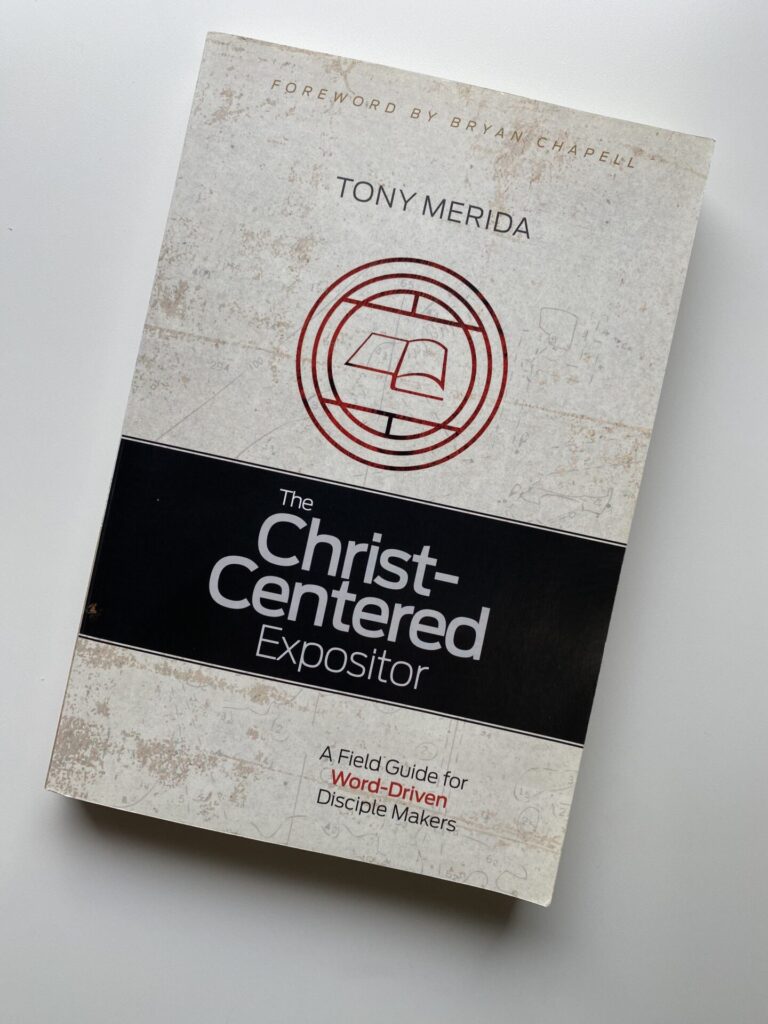Merida, Tony. The Christ-Centered Expositor: A Field Guide for Word-Driven Disciple Makers. Nashville: B&H Academic, 2016. 244 pages.
Review by Jeff W. Mingee

In The Christ-Centered Expositor, Tony Merida helps preachers examine themselves and their sermons with an unwavering focus on Jesus as hero. Merida serves as the Pastor for Preaching and Vision at Imago Dei church in Raleigh, NC; as well as serving as Dean at Grimké Seminary and Director of Theological Training at Acts 29. He writes with pastoral sensitivity, knowing that Sunday is always coming for the preacher; and with intellectual integrity, knowing that preaching must be studied and improved. He writes from the preacher’s pulpit and the professor’s lectern.
Merida aims at preachers and teachers of the Word. He explains, “If you take our Lord’s commission seriously, then this book is for you. If you have (or aspire to have) an official teaching position in the church, then this book is especially for you” (xvii). In this, Merida serves an audience beyond the pulpit and a purpose beyond the sermon. He clarifies, “I hope to address both the heart and the message of all Word-driven disciple makers […] My prayer is that we all teach the Word of Christ more faithfully and effectively, and that we will treasure the Christ of the Word more deeply” (xix). He succeeds wonderfully.
Merida engages both the person of the preacher and the process of sermon preparation with a Christ-centered attentiveness. Merida warns, “My concern is not that the Bible is absent in the weekly sermon. My concern is the seeming great lack of gospel clarity in weekly preaching and teaching. I am troubled by the lack of gospel-saturation in weekly messages, even by many who say they believe the gospel” (66). The Christ-Centered Expositor is a gospel-saturated answer to this problem.
Merida divides the material into two parts: the first, examining the “Expositor’s Heart” (ix) for Christ-centeredness and the second, ensuring the “Expositor’s Message” (ix) is Christ-Centered.
In chapter one, Merida opens with a helpful and general chapter that introduces the themes of his book. He engages the person of the preacher by offering “nine ingredients that contribute to the making of a great expositor” (2 – 5) and calls the preacher to self-examination. He goes on to begin developing a definition of preaching, “faithful preaching involves explaining what God has said in his Word, declaring what God has done in his Son, and applying this message to the hearts of people” (9). Merida develops his Christ-centered message by calling for a self-examination by potential preachers. He explains, “It is essential that we understand the importance of our character in a book about speaking the Word. Apart from personal holiness, we do not have an expositional ministry” (26). Merida consistently confronts the reader with such powerful truths.
He then calls the Christ-centered preacher to value the Christ-centered Word. He explains, “Apart from the Scriptures we have no authority by which to preach. But with the Scriptures we have no reason for not proclaiming it boldly and faithfully” (46). He helps the preacher understand how our convictions drive our communication and the importance of Christ-centeredness in our convictions about the Bible. “A Christ-centered understanding of Scripture should lead us to a Christ-centered philosophy of expository preaching” (54). Merida powerfully exposes the Christocentric nature of the Word.
In chapter four Merida explains his goal to every potential Word-driven communicator, as to “challenge you with one main idea: To passionately make the hero of the Bible (Jesus) the hero of every message you prepare” (59). Here Merida begins to build the bridge between the character of the messenger and the content of the message, maintaining a clear focus on Christ for both.
Merida explains that the task of preaching the word of God is impossible without the Spirit of God. He clarifies, “In this chapter I will focus my attention on only two activities of the Spirit: called by the Spirit and proclaiming by the Spirit.” (83). The Spirit’s activities include calling, sanctifying, empowering, emboldening and others. The preacher is called, sanctified, and proclaims. Nonetheless, Merida rightly summarizes, “From start to finish, preaching is a spiritual activity. Spirit-called preachers should maintain a proper balance of diligent study of the Scriptures and a desperate reliance upon the Spirit” (96).
In chapter six, Merida writes, “to remind you of the priority of prayer as a pastor-preacher and encourage you with some biblical and practical insights that I have picked up along the way from some seasoned veterans” (97-98). Here Merida offers several practical helps as he gives examples of prayer (98-102), challenges common excuses (107-109) and sinful actions (109-110) that hinder prayer, and even offers a section on “More Practical Tips on Prayer” (110-112). However, there is little focus on the Christ-centeredness at which he was originally aiming.
Paul writes in 1 Cor. 10:31, “whatever you do, do to the glory of God.” Merida, in chapter seven, helps us apply that to preaching. He reminds the preacher, “A primary role of an expositor is to escort the hearers into the arena of God’s Word, so that they may experience God’s glory in the face of Jesus Christ (2 Cor. 3:18-4:6)” (116). It is not enough to remember this as our task in preaching, as Merida explains, “But before we usher the hearers into the arena of God’s Word, we need to experience the Triune God’s glory personally” (116). As noted earlier, one of the outstanding strengths of The Christ-Centered Expositor is Merida’s consistent call to personal application and worship.
Chapters eight through fourteen turn the attention from the heart of the expositor to the message of the expositor. Here, Merida shifts from writing as a pastor who is examining the heart of a man to a professor who is compassionately preparing a man for the task of preaching. He offers five steps to guide the process: study the text (chapter eight), unify the redemptive theme (chapter nine), construct an outline (chapter ten), develop the functional elements (chapter 11), and finally add an introduction and a conclusion (chapter 12). Merida then helps the preacher with insights on delivering the Word and contextualizing the message (chapters 13 and 14). Throughout the preparation, Merida consistently recalibrates the process with a focus on Christ. Multiple appendixes include additional helps to the preacher including a sermon evaluation form.
Attentive readers will leave with some questions. There is an irony in that The Christ-Centered Expositor does not begin with a Christ-Centered opening chapter. Instead, Merida writes with the assumption that his readers are convinced that Christ is worthy of being central, offering some “basic questions and foundations for proclaiming the Word” (2). Also in chapter one, Merida offers one short paragraph on an initial definition of preaching and then spends three paragraphs on “ranting” (9). Readers might think that Merida is ranting about ranting; and seems to drift from his normally consistent Christ-centered focus. In chapter five, where Merida addresses the Spirit, he focuses on the activities of preachers, not activities of the Spirit. He also neglects the Christocentric nature of the Spirit while emphasizing the dependence of the preacher on the Spirit for preaching. Preacher, you have a Christ-centered Spirit who enables you for Christ-centered preaching.
Merida’s The Christ-Centered Expositor is a must read for those aspiring to teach or preparing to teach the Bible. From Merida’s recognition of the Trinity in preaching (12) to his careful application of Scriptural passages on preaching (69, 90-91) to his attention to the Baptist Faith & Message 2000 (53), I found myself writing “YES!” in the margins frequently. The book offers three distinguishing benefits. First, it is exclusively Christ-centered. From beginning to end, Merida keeps Jesus as the central hero. He helps the preacher look at himself through a Christ-centered lens, as well as helps to consider the content of the sermon with Christ at the center. Secondly, it is pastorally applicable. As in a well-preached sermon, Merida weaves application throughout the book. He challenges preachers to personally digest the word before preaching it (30), calls preachers to warn their listeners (71), urges them to experientially depend on the Holy Spirit (87), and demands that they be men of prayer (100). Merida’s application not only stirs the will but enflames the heart. He writes,
Make disciples of Jesus by proclaiming him like an evangelist, warning like a prophet, teaching like a theologian, and applying wisdom like a sage. Preach Christ until you die! Preach him on earth, until you see him in glory. I promise you on that day, you will not regret having made him the hero of the Bible, the hero of every message you prepare (80).
Thirdly, it is accessible. Pastors who long to better equip others for the task of preaching will find this is a valuable resource. Merida does not weary the reader with an onslaught of academically impressive words that are beyond the normal vocabulary. Merida writes to prepare men to preach. This book is highly recommended to those engaging in the task of expository preaching and teaching.
